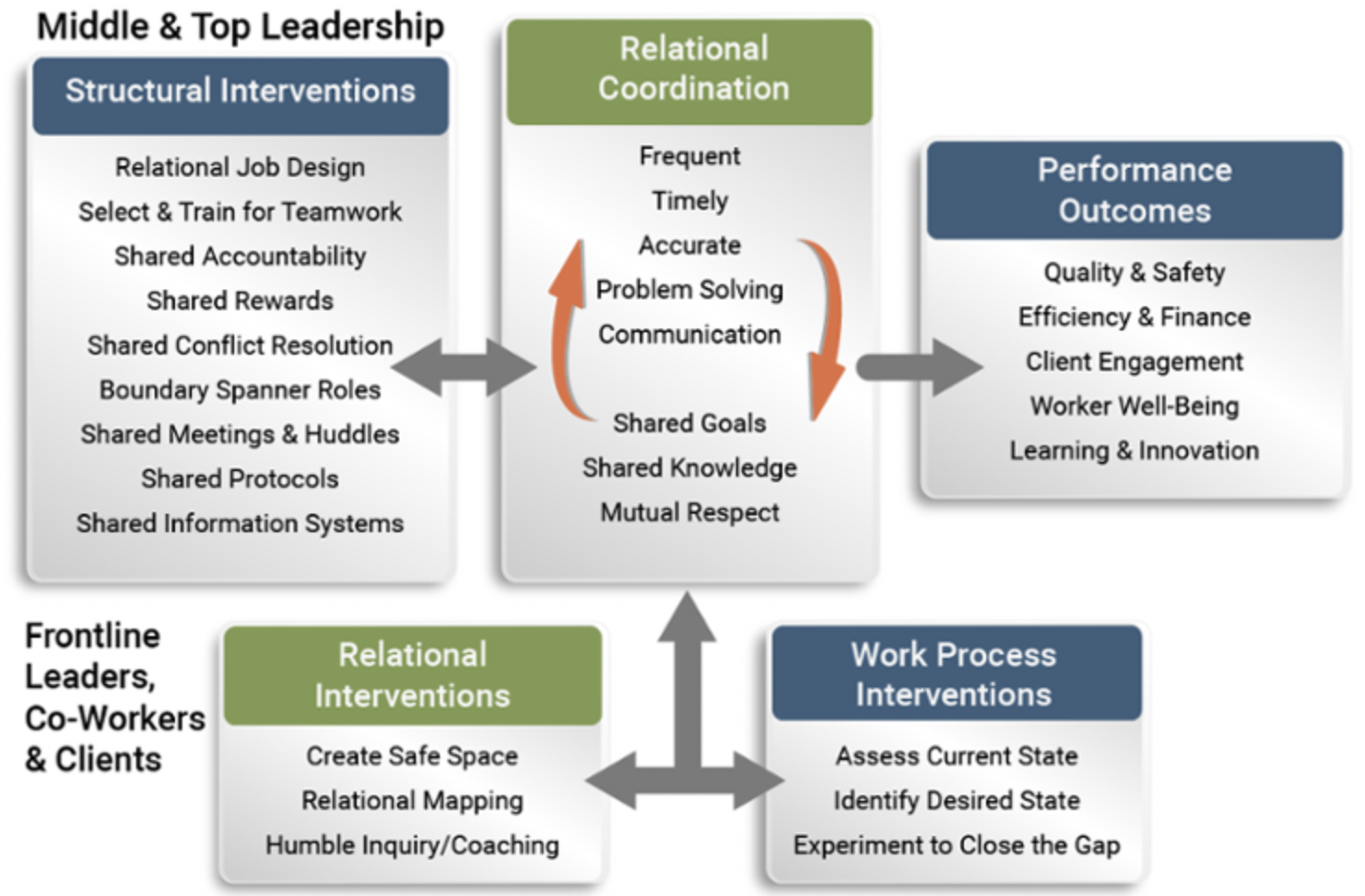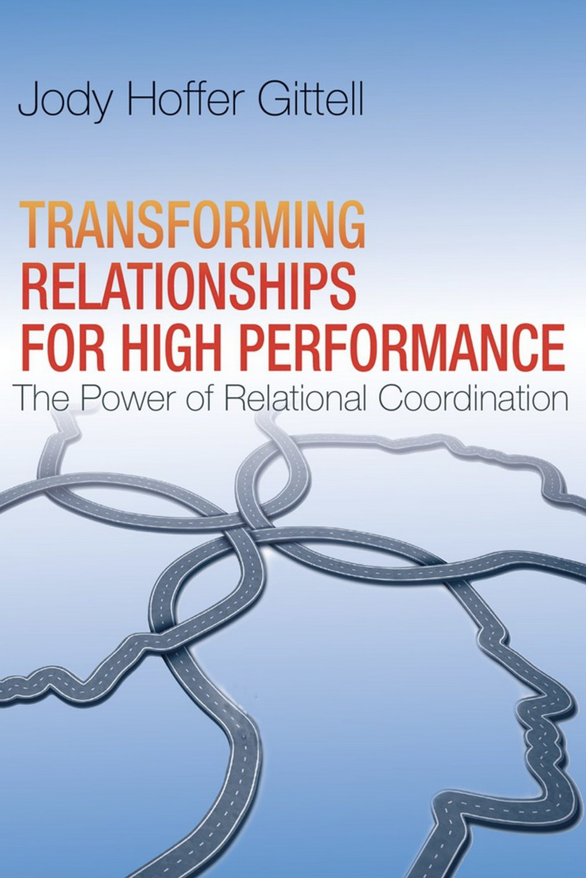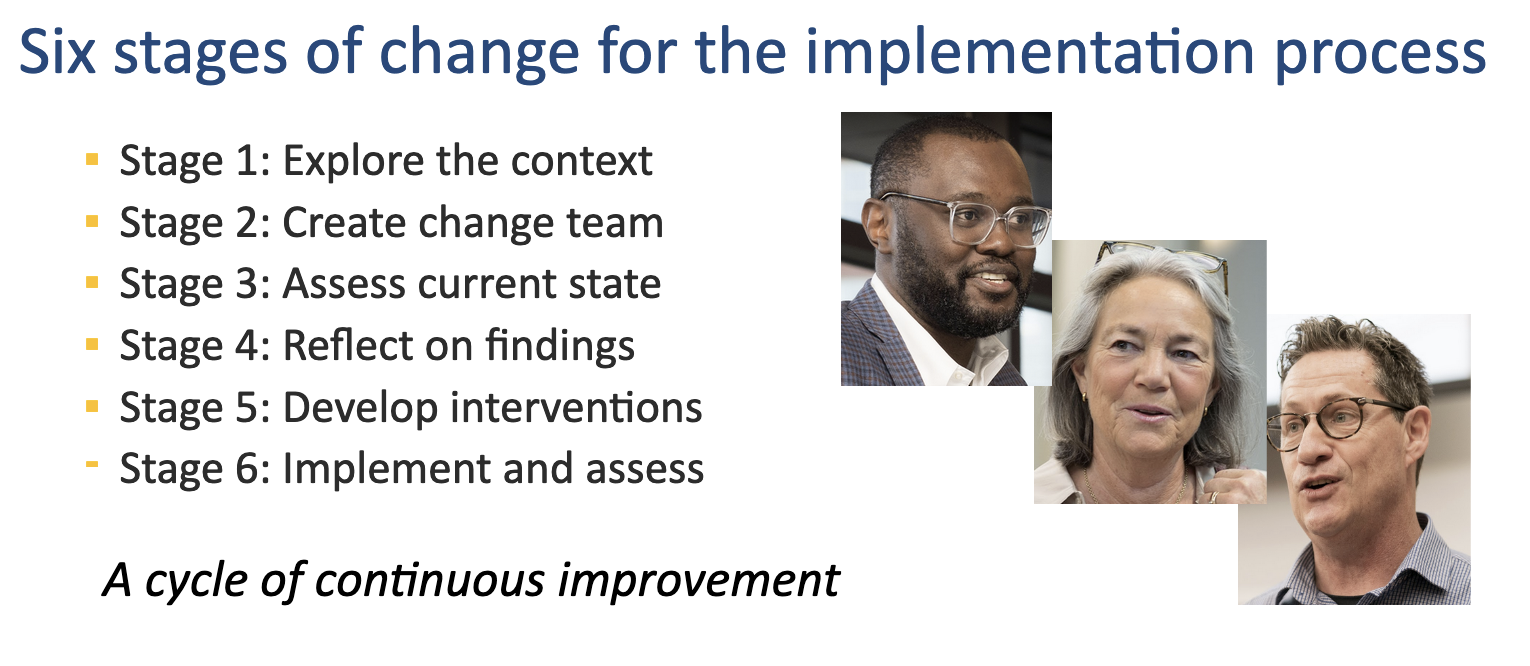How do we get from here to there?
How can we deliberately intervene to change both organizational structures and relational dynamics in order to produce sustainable, cost-effective, high-quality outcomes? To address these questions, Jody Hoffer Gittell worked with Amy Edmondson and Ed Schein, with input from colleagues in many fields of research and practice, to develop the Relational Model of Organizational Change. See below for the latest research about it, and visit the RC Toolbox for tools to implement it.

The Relational Model of Organizational Change is implemented using a cycle of continuous improvement
The model includes three kinds of interventions that work together...
Relational interventions build new relationships based on shared goals, shared knowledge and mutual respect (see Chapter 11, Relational Interventions to Create New Ways of Relating)
Work process interventions use a cycle of improvement to embed these relationships into the everyday work (see Chapter 12, Work Process Interventions to Create New Ways of Working)
Structural interventions support and sustain these relationships with cross-cutting organizational structures (see Chapter 13, Structural Interventions to Support and Sustain the New Relational Dynamics)

A growing number of studies have explored how the Relational Model of Organizational Change is used in practice, from healthcare to construction, and from human services to community change.
Research Foundations for the Relational Model of Organizational Change (starting with most recent)
Please write to relationalcoord@brandeis.edu with additional publications to post here.
- Anderson, A. J., Noyes, K., & Smith, S. D. (2026). Social network analysis and relational coordination: Empowering nurse administrators leading care coordination teams to assess improvement opportunities. JONA: The Journal of Nursing Administration, 56(2), 86-91.
- Olive, M. V., Gastaldi, L., & Appio, F. P. (2026). Relational coordination in medical work: The role of digital health practices. Technological Forecasting and Social Change, 224, 124508.
- Bond, B. & Gebo, E. (2025). Exploring the relational model of change as a facilitator of interorganizational change. The Journal of Applied Behavioral Science.
- Gomes, P. J., & Mirzaei, T. (2025). Evolving dynamics of relational coordination: A study of progression of care huddles in hospital observation services. Medical Care Research and Review, 82(1), 88-99.
- Hajjar, L., Olaleye, O., Yang, J., McGirr, S., & Sullivan, E. E. (2025). Relational coordination and team‐based care: Change initiative overload and other challenges in a learning health system. Learning Health Systems, e10455.
- McLean, D., Connor, M., Marshall, A. P., McMurray, A., & Jones, L. (2025). Illuminating power dynamics that influenced a relational coordination program in a tertiary hospital: An institutional ethnography study. Health Care Management Review, 50(1), 23-31.
- McLean, D. (2025). How Ruling Relations Shaped the Implementation of a Relational Coordination Program in a Large Australian Public Hospital. Griffith University, School of Nursing and Midwifery.
- Grøn, A.B., Hvilsted, L., Ingerslev, K., Jacobsen, C., Bech, M. & Holm-Petersen, C. (2024). Can leadership improve interorganizational collaboration? Field-experimental evidence from a team-based leadership training intervention. The American Review of Public Administration.
- Kragen, B. (2024). Impact of Secure Messaging on Health Equity, Care Coordination, and Diabetes Outcomes. Brandeis University, The Heller School for Social Policy and Management.
- Hajjar, L., Gittell, J. H., Stephens, J. P., Meier, N., & Cutcher Gershenfeld, J. (2024). Seeing the whole together through relational mapping: A method for engaging in complex systems change. The American Review of Public Administration.
- Spitzer, E. G., Kaitz, J., Fix, G. M., Harvey, K. L., Stadnick, N. A., Sullivan, J. L., ... & Miller, C. J. (2023). Developing relational coordination: A qualitative study of outpatient mental health teams. Administration and Policy in Mental Health and Mental Health Services Research, 50(4), 591-602.
- van Staalduinen, D. J., van den Bekerom, P. E., Groeneveld, S. M., Stiggelbout, A. M., & van den Akker-van, M. E. (2023). Relational coordination in value-based health care. Health Care Management Review, 48(4), 334-341.
- Bolton, R. E. (2023). The Whole Is Greater Than the Sum of Its Parts: How Implementing Whole Person Healthcare Systems Improves Uptake of Nonpharmacologic Therapies Among Patients With Chronic Musculoskeletal Pain. Brandeis University, The Heller School for Social Policy and Management.
- Brazil, V., McLean, D., Lowe, B., Kordich, L., Cullen, D., De Araujo, V., ... & Purdy, E. (2022). A relational approach to improving interprofessional teamwork in post-partum haemorrhage. BMC Health Services Research, 22(1), 1108.
- Gebo, E., & Bond, B. J. (2022). Improving interorganizational collaborations: An application in a violence reduction context. The Social Science Journal, 59(2), 318-329.
- Olaleye, O. E. (2022). Team-Based Care, Relational Coordination and Worker Outcomes: The Role of Frontline Workers. Brandeis University, The Heller School for Social Policy and Management.
- Bolton, R., Logan, C., & Gittell, J. H. (2021). Revisiting relational coordination: A systematic review. The Journal of Applied Behavioral Science, 57(3), 290-322.
- Thygeson, N. M., Logan, C., Lindberg, C., Potts, J., Suchman, A., Merchant, R., & Thompson, R. (2021). Relational interventions for organizational learning: An experience report. Learning Health Systems, 5(3).
- Purdy, E., Alexander, C., Shaw, R., & Brazil, V. (2020). The team briefing: Setting up relational coordination for your resuscitation. Clinical and Experimental Emergency Medicine, 7(1), 1.
- Purdy, E. I., McLean, D., Alexander, C., Scott, M., Donohue, A., Campbell, D., ... & Brazil, V. (2020). Doing our work better, together: A relationship-based approach to defining the quality improvement agenda in trauma care. BMJ Open Quality, 9(1), e000749.
- Brazil, V., Purdy, E., Alexander, C., & Matulich, J. (2019). Improving the relational aspects of trauma care through translational simulation. Advances in Simulation, 4, 1-10.
- Best, J. (2017). Factors and Processes Underlying Increases of Relational Coordination in Task-Coordinating Groups. Saybrook University, Organizational Systems.
- Gittell, J. H. & Storch, J. (2016). Building a relational public sector. Stanford Social Innovation Review. October 4.
- Gittell, J. H. (2016). The relational model of organizational change. Transforming Relationships for High Performance: The Power of Relational Coordination. Stanford University Press.
- Gittell, J. H. (2016). Relational coordination at Group Health. Transforming Relationships for High Performance: The Power of Relational Coordination. Stanford University Press.
- Gittell, J. H. (2016). Relational coproduction in Varde Municipality. Transforming Relationships for High Performance: The Power of Relational Coordination. Stanford University Press.
- Gittell, J. H. (2016). Relational leadership at Dartmouth Hitchcock. Transforming Relationships for High Performance: The Power of Relational Coordination. Stanford University Press.
- Gittell, J. H. (2016). Bringing it all together at Billings Clinic. Transforming Relationships for High Performance: The Power of Relational Coordination. Stanford University Press.
- Logan, C. (2016). Understanding Organizational Change in Response to New Payment Models in Healthcare. Brandeis University, The Heller School for Social Policy and Management.
- Resnick, J., Lax, S., Temkin, E., & Gittell, J. H. (2016). Building relational coordination across front-line work groups: A case from Kaiser Permanente Northwest. Avgar, AC, Vogus, TJ, The Evolving Health Care Landscape: How Employees, Organizations, and Institutions Are Adapting and Innovating.
- Gittell, J. H., Godfrey, M., & Thistlethwaite, J. (2013). Interprofessional collaborative practice and relational coordination: Improving healthcare through relationships. Journal of Interprofessional Care, 27(3), 210-213.
- Gittell, J. H., Seidner, R., & Wimbush, J. (2010). A relational model of how high-performance work systems work. Organization Science, 21(2), 490-506.
- Carmeli, A., & Gittell, J. H. (2009). High‐quality relationships, psychological safety, and learning from failures in work organizations. Journal of Organizational Behavior, 30(6), 709-729.
- Gittell, J. H., & Weiss, L. (2004). Coordination networks within and across organizations: A multi‐level framework. Journal of Management Studies, 41(1), 127-153.
- Gittell, J. H. (2002). Coordinating mechanisms in care provider groups: Relational coordination as a mediator and input uncertainty as a moderator of performance effects. Management Science, 48(11), 1408-1426.
- Gittell, J. H., Fairfield, K. M., Bierbaum, B., Head, W., Jackson, R., Kelly, M., ... & Zuckerman, J. (2000). Impact of relational coordination on quality of care, postoperative pain and functioning, and length of stay: A nine-hospital study of surgical patients. Medical Care, 38(8), 807-819.

